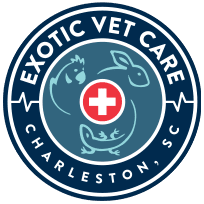February is Pet Dental Health Month, and while it is common for dogs and cats to visit their veterinarian for regular dental examinations and cleanings, the dental health of exotic pets is often overlooked until there is an obvious issue, such as lack of appetite, drooling, pawing at the mouth, or visible irritation or abscesses. By the time the situation is noticed, the dental disease can be severe, requiring extraction of teeth, systemic antibiotics, and an extended recovery period requiring supportive care and nutrition until your pet resumes his normal behavior. In some cases a complete dietary change may be required as your pet adapts to a life with fewer or no teeth.
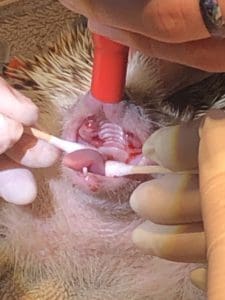
This hedgehog had severe periodontal disease (inflammation and damage of the tooth socket and ligaments) as well as stomatitis (irritation of the gingiva and mucosa) from a history of poor diet. He had several dental procedures to remove the diseased teeth and help make his mouth more comfortable.
Who gets dental issues? Anyone with teeth! Of course you may immediately think of the constantly growing teeth of rabbits, guinea pigs, and chinchillas, but we also regularly provide dental care for ferrets, hedgehogs, bearded dragons, and even a puffer fish!
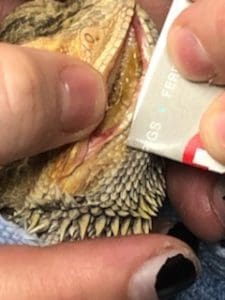
This bearded dragon was suffering with severe periodontal disease (inflammation +/- infection of the tissue that holds the teeth in place). Most commonly you will see redness or swelling of the gums around the teeth but it can eventually loosen the teeth or even cause them to fall out.
So what do you do? Your guinea pig is not going to open up and say “AAH” on demand, your rabbit is not going to waft “death breath” in your face like a dog or cat might, and your bearded dragon is not going to give you sad eyes to let you know his jaw hurts. The best prevention is to bring your exotic pet to a qualified specialty veterinarian for a comprehensive checkup twice a year. This close monitoring of your pet’s weight, appearance, appetite, and behaviors creates a record of what is normal for your pet, and if there is any indication of an issue, proper diagnostics and treatments can begin right away. Your pet may need to be sedated and/or anesthetized for an open-mouth examination using special tools to allow us total access to the mouth. X-rays may be performed to provide complete visualization of the roots and jawbone, which are as important if not more important than the portions of the teeth you can see. Your pet’s dental procedure will be thorough, including cleaning and scaling, proper trimming, and manual or surgical extraction of teeth as needed. Appropriate follow-up care, pain management, and antibiotics will be provided as necessary, and we will make sure you are advised of the best way to help keep your pet’s teeth in their best shape for as long as possible.
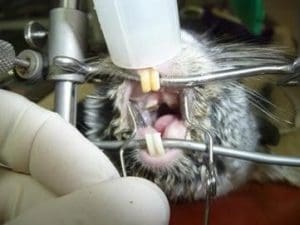
This chinchilla’s upper maxillary cheek teeth were growing into the side of her mouth, causing severe pain. Filing eased her immediate pain in the short-term, but assessing the rest of the teeth was vital to devise a long-term treatment plan.
Read more about recognizing the signs of, treating, and preventing dental issues in your pet HERE. Whether you have a new pet, or one who just hasn’t had a good oral examination in a while, we are here for you. You can book your pet’s visit at the link as well. We are here to help your pet live a longer, healthier, happier life, and that’s THE TOOTH!
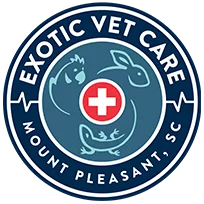
About Us
Our exotic animal hospital is dedicated exclusively to the care of birds, exotic small mammals, reptiles, and even fish! We can offer everything your pet needs for a healthy and happy life, from wellness care and grooming to diagnostics and dentistry, but we can also provide emergency care during our opening hours, along with more specialized treatment for referred patients.
